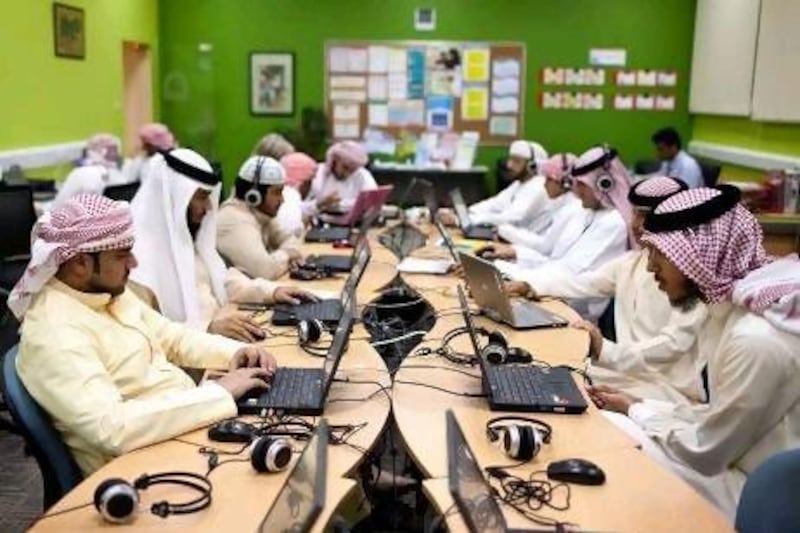ABU DHABI // Hundreds of teenagers face disappointment this week when the federal universities announce which students have won places for September.
The Higher Colleges of Technology, largest of the three federal universities, has raised the bar for entry from a score of 140 in the CEPA high-school exams to 150. It says about a fifth fewer students are likely to make the grade.
CEPA is the Common Educational Proficiency Assessment, standardised tests developed by the federal universities to regulate admissions.
HCT, which admitted about 4,000 students to its 17 campuses last year , has been trying to raise standards in recent years. Last year it imposed an entry mark of 140. Previously there was no minimum, and any Emirati school-leaver who wanted a place was guaranteed one.
The other two federal universities, Zayed and UAEU, already set a minimum of 150.
The names of this year's intake will be announced on Tuesday by Sheikh Nahyan bin Mubarak, the Minister of Higher Education and Scientific Research.
Dr Senthil Nathan, vice provost at HCT, believes the previous lax entry standards were only storing up trouble for later, as students were admitted with poor grades only to drop out within a year.
A CEPA score of 140 means "essentially no English ability", 140-149 "poor English ability, not likely to succeed in higher education" and even 150-159 is an "at-risk student, who will struggle in foundations programme".
Only students scoring 180 can go straight into their degree studies - but fewer than one in 10 do. The rest have to take remedial courses.
A student with the average score, 160, can expect two remedial years before starting their degree proper.
But many do not make it that far, with around 20 per cent dropping out in their first year of remedial studies. Dr Nathan hopes insisting on a score of 150 will reduce that drop-out rate.
"When you take these students below 150, many of them fail, a large number, so it's really a waste of time for everybody, the students in particular."
He believes the new requirement is being felt by schools, with the result that the number of students getting 150 is rising. "You set the standards and then the high schools and students will catch up. The message is going to the schools for sure."
Nevertheless, hundreds of young Emiratis will not make the grade. And with HCT now awarding only degrees instead of the diplomas it previously offered, those less academic school-leavers have no obvious place in the federal universities.
"What we're looking at is to look at diplomas and vocational programmes so there will be provisions. We're working with the Government to offer different options.
"We want to put them in programmes where they can reasonably succeed, not to turn anyone away. It's a false premise otherwise, saying they can succeed if they can't."
That is something of a turnaround for HCT - founded to offer vocational training - just a year after its shift to degrees. Dr Nathan characterises the shift as an "evolution", as HCT tries to find solutions for "the majority of students, who come with little preparation for higher education".
Peter Hatherley-Greene, who taught at HCT for nearly 17 years, said the institution was under "enormous social pressure" to educate even those students who miss the 150 mark.
"It is a basic human right to obtain a degree in your first language," he said. "Perhaps HCT should look at investing money into work-readiness programmes where most of the instruction is in Arabic."
Dr Naji Al Mahdi, head of Nive, the National Institute for Vocational Education, in Dubai, said more alternatives to degrees are needed.
Otherwise, he fears that in 10 years there could be a "huge glut of people with degrees, who have high expectations that can't be met".
He wants better access to vocational education. "The system isn't providing enough choices at different levels. Either you pass your English and get your higher education free, or you fail and you have to pay."
But he suspects it may be too late to free vocational courses of their stigma. "We didn't create the options first before we went down this one-track degree system.
"Nive is only present in Dubai. There are other institutes in Abu Dhabi and Sharjah but there are other emirates in which this alternative is not available.
"If we don't give them the choices now, in the future we'll ask why they don't want to take the practical jobs."






